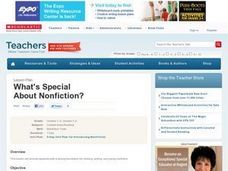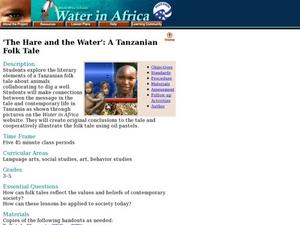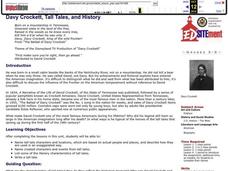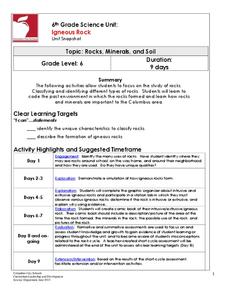Curated OER
Fungi
Why did the mushroom go to the party? Because he was a fun guy! Biology learners study fungi while completing this worksheet. Structure is compared to that of other life forms. The life cycle is displayed with colorful diagrams for...
Curated OER
What's Special About Nonfiction?
Students examine the difference between nonfiction and fictional writing. They identify the characteristics of nonfiction literature and examine how a nonfiction textbook organizes information.
Texas Instruments
Is It or Isn't It Proportional
How can you tell if number relationships are proportional? Mathematicians investigate proportional relationships. They compare and contrast functions and graphs to determine the characteristics of proportional relationships, as well as...
Curated OER
I Can Be Whomever I Wish
Famous people who have overcome obstacles are the focus of this language arts and social studies lesson. Pupils are introduced to the concept that they have the ability to overcome obstacles in life. They read selections embedded in the...
Curated OER
The Hare and the Water: A Tanzanian Folk Tale
"The Hare and the Water," a Tanzanian folk tale, lends a global perspective to literary analysis. Learners spend the first two days reading and storyboarding. On day three, they examine folk tale elements (worksheet included), and design...
Curated OER
E.T., Are You Out There?
Research the necessary components of a planet that supports life after reading the article "All of a Sudden, The Neighborhood Looks a Lot Friendlier" from The New York Times. After finding their information, middle and high schoolers...
Curated OER
Creating and Presenting Haiku with Kid Pix
Third graders research what a Haiku is and be able to answer related questions on an example of a Haiku. They create an original Haiku of their own using general Haiku characteristic guidelines. Students use Kid Pix to type in and...
Special Olympics
A World of Difference
Kids engage in a series of activities that ask them to consider differences and similarities in characteristics, both visible and invisible. With this new understanding, the class investigates the Special Olympics program and develops...
Curated OER
SuperShapes, Part 1; "Tri"ing Triangles
An outstanding lesson on triangles awaits your math scholars. Learners focus on the triangle, which is the strongest of all polygons. They see the role that triangles play in the design of buildings, and learn about triangle...
Curated OER
Character Traits: Yang the Youngest and His Terrible Ear
Lensey Namioka’s Yang the Youngest and His Terrible Ear provides an opportunity for young readers to observe how writers bring their characters to life. Each class member selects a character to trace through the novel, recording...
Curated OER
Born on a Mountaintop? Davy Crockett, Tall Tales, and History
Students compare and contrast the details from the life of the real David Crockett and the legendary folk hero he later became. They identify the characteristics of a tall tale and follow a rubric to create a tall tale of their own.
Curated OER
AP: Chapter 18: Microbial Models
AP biology and college microbiology classes benefit by completing this seven-page worksheet on microbes. An exhaustive set of questions addresses the characteristics and reproduction of viruses, classification and uses of bacteria, and...
Curated OER
Classifying Plants and Insects
Art and science come together in a instructional activity based on Flower Still Life by Ambrosius Bosschaert the Elder. Learners classify plants and insects in the painting by color, leaf shape, size, reproduction, and season of bloom.
Curated OER
Seasonal Science: Spring Life Science Activities
Spring into science with these great lesson ideas involving butterflies.
Curated OER
Volcanoes
Students investigate the processes and characteristics of volcanoes. They watch real-life videos of volcanoes and identify the physical features and eruption types, create a notebook of volcano characteristics, and identify volcano...
Curated OER
Asian Cinderella Tales
Explore the world of fairy tales using this lesson plan focusing on higher- order thinking skills. Learners compare and contrast an Asian Cinderella story to other versions. It is a great way to review the characteristics of the genre...
Curated OER
Changing Planet: Permafrost Gas Leak
Pair earth scientists up to use an amazing online arctic portal mapping tool and Google Earth to analyze permafrost changes. They compare changes to data on atmospheric concentrations of methane to see if there is a correlation. Then...
Curated OER
Chemical Equations and Reactions
Graphic organizers, photos, diagrams, and text bring the world of chemical reactions to life. By viewing this presentation, young chemists learn how to recognize when a chemical reaction has occurred, and how to balance chemical...
Columbus City Schools
Igneous Rock
These rocks are HOT! Well, they used to be, anyway. Take young geologists on a two-week journey through the life and times of the average igneous rock. Lab groups work together to hypothesize about intrusive and extrusive igneous rock...
Curated OER
Life Inspires Art Inspires Life
Students create philanthropic documentaries. In this philanthropy activity, students collaborate to create a multimedia documentary regarding the community philanthropy work they took part in.
Curated OER
James Brown: Life and Times
Students trace James Brown's rise from "Little Junior" in Depression-era Augusta, Georgia, to the "Minister of the New Super Heavy Funk" and create a collage that captures his impact on American music.
Curated OER
Ship of the Line
Students discover boats by researching 18th century ships. In this Naval history lesson, students identify and describe the different components of an 18th century naval ship after researching information on the Internet. Students...
Curated OER
Lost Ladybugs
Students study ladybugs. In this life science lesson plan, students collect ladybugs from the schoolyard and explore their characteristics. Students illustrate pictures of ladybugs.
Curated OER
Fishing
Young scholars discuss various aspects of the importance of fish. In this fishing lesson, students understand why fish keep us healthier. Young scholars sort sea animals by their characteristics, play "who am I?", discuss various types...

























